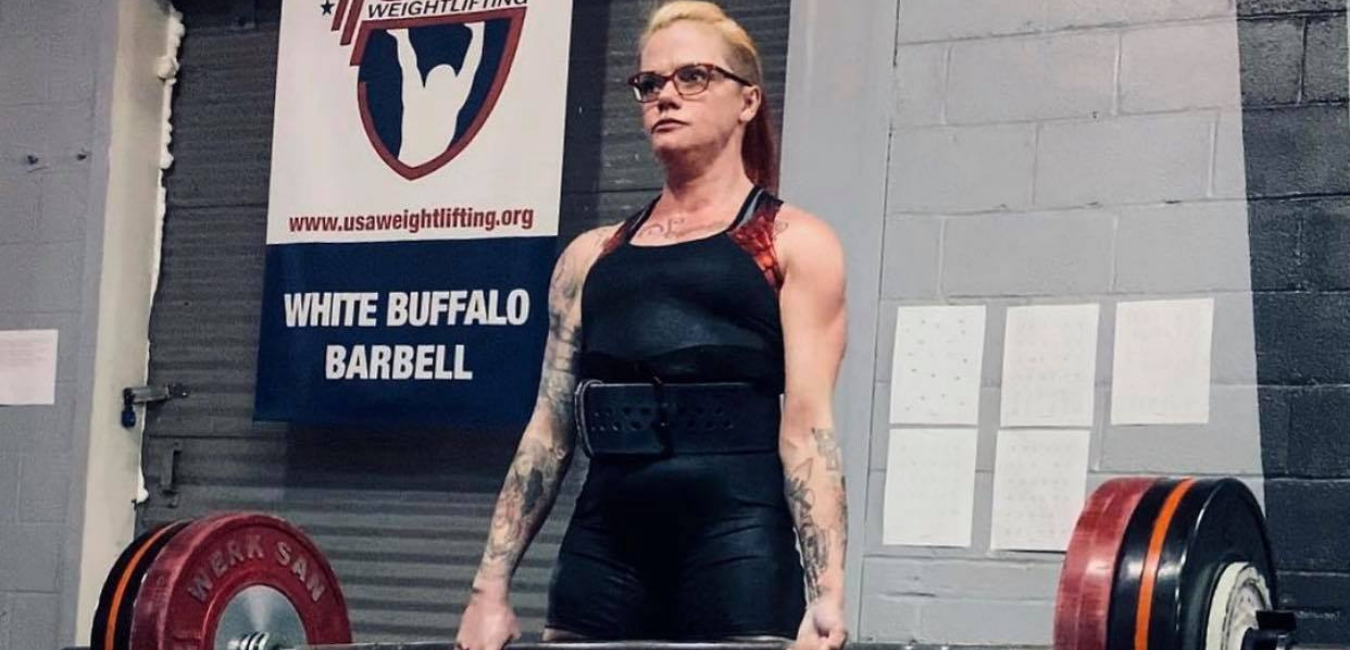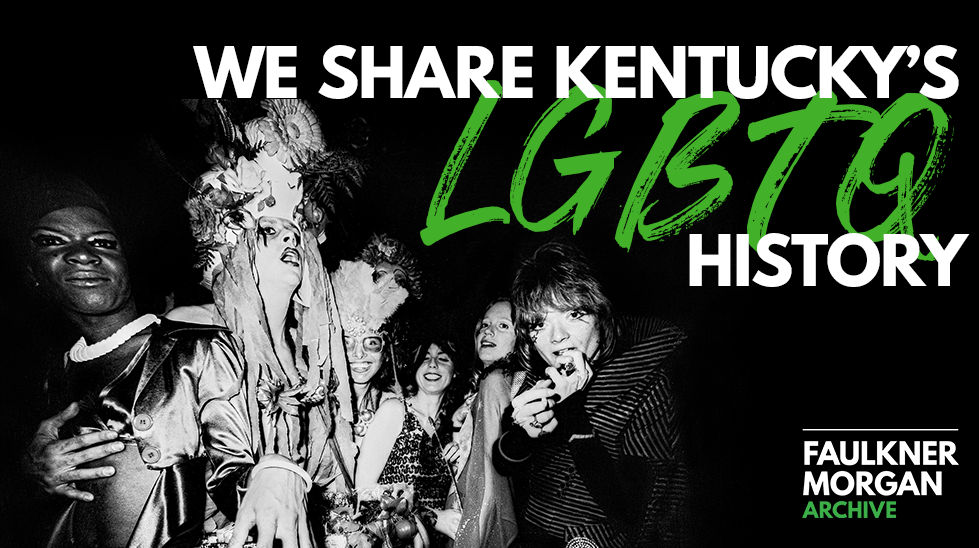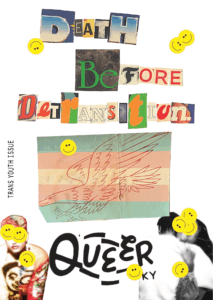Kentucky-born Trans fitness trainer brings affirmation, butt-busting workouts to clientele
My first encounter with Parker was definitively intimate. They were responding to a call I had put out for trans protestors who had spent time in the Louisville Metro Department of Corrections. I explained to them that I was a trans man who had been arrested at a direct action a few weeks prior, and described my unfriendly encounter with a transphobic intake officer. In turn Parker shared their own traumatic jail experience as a “female passing” transmasculine inmate: details from which are now being used in trans sensitivity trainings at LMDC.
Roughly one year later, I found myself reaching out to Parker again, this time after learning that they were a competitive powerlifter and personal trainer. I had been looking into fitness and nutrition coaches to help me rewire some of the unhealthy residual thought patterns I have leftover from my eating disorder. But I was struggling to find someone who know about these issues and also about transgender bodies and experiences: a tall order, especially here in Kentucky.
Parker is all that and more. As someone who is AFAB (assigned female at birth) they have firsthand experience with aspects of my anatomy and physiology that even a gay trainer who was cisgender wouldn’t. As a trans person, they understand gender dysphoria and euphoria, and how these feelings can both inhibit and motivate me. They are aware of my body’s complexities, and the effects that hormone therapy and certain surgeries have on my body. I don’t have to feel awkward bringing this stuff up, or do the emotional labor of explaining what it is and why it matters.
And Parker and I have more in common than just our transness. We also share a common political orientation, and common dream of liberation. For me, recovery means doing the work to dismantle my unsustainable ways of thinking, acting, and relating. And activism, to me, means doing the work to dismantle white supremacy (and all of the other isms that are baked into it: racism, classism, sexism, cissexism, heterosexism, ableism, and so on). I feel incredibly lucky to be working with a trainer who understands my unique mental and physical challenges, but who also understands my greater aims: healing and strengthening my body, mind, and spirit, so that I can sustain my efforts toward creating a more just world, and so that I can show up more fit to do that work.
Without further ado, let me introduce you to Parker.
Adrian: How/why did you become a personal trainer?
Parker: The first time I ever set foot in a gym was right after ending an abusive marriage of 6 years. I had developed a sizable drinking problem during that marriage and was looking for a healthy coping mechanism to replace it with. I immediately fell in love with everything about training. Being a low income single parent of 3 at
the time made it very difficult to consistently work out, however. Fast forward several years and after an inpatient psychiatric stay for a suicide attempt and another intentional period of sobriety, I found myself back in the gym for the same reasons. However, this time I wanted to be able to really make it a solid part
of my lifestyle that I’d be able to stick with long term. So I took a HUGE leap and decided that I wanted to compete as a competitive powerlifter. At the time, I was still in the closet as genderqueer and trans… to the degree that I had not realized I was and still identified as a woman. I had several female friends who had taken
up the sport over the years and I adored what it seemed to do for them. I wanted to be strong as hell and I admired the muscle they seemed to pack on. I figured that if I committed to a static long term goal of a competition, I would be more likely to regularly train and not give it up so quickly this time. It WORKED! Far
better than I had ever imagined it would. I was enamored with the new muscular body I had, the incredible strength I’d gained, the benefits to my mental health.
The gym was the first place I ever experienced gender euphoria, though I didn’t know that was what was happening to me at the time. I am also on the Autism Spectrum and this had become a special interest of mine. The science involved fascinated me. After a year or so of training and competing, I found myself eager to move to the other side of it all and start helping people find what I had in the gym. I had been a certified nursing assistant for a decade and a half at that point.
I chose the field because I have an innate need to help “fix” the world around me and could never have a job where I wasn’t helping people. Healthcare seemed to marry my love of science with that need and I thought it was my only option in that way… until I realized that with personal training, instead of healing people after they were sick or had become unhealthy, I could attack it from the other end and help people lead a lifestyle that might prevent them from becoming unwell to begin with. So I took another huge leap and worked to get certified as a CPT through the NSCA (National Strength and Conditioning Association. My coming out as non-binary and trans masculine actually occurred as a result of training and being a coach. I worked for a very inclusive gym at the time with one of my own coaches and they decided that they wanted to include pronouns in staff bios on their website. When I wrote mine, I used they/them pronouns for the very first time.
Adrian: Has your involvement in movement work shaped how you approach or think about training?
It has had a significant impact. Obviously, the COVID 19 pandemic put a pretty solid halt to my training and coaching in early 2020. That summer, I decided to throw myself into movement work with the free time I suddenly found myself with. Before last summer, I would likely have considered myself a liberal. But my work in the movement completely radicalized me socially and politically. I was exposed to so many different yet intersectional groups of marginalized people. I grew a much better understanding of gender, classist and ableist
structures that affect those groups. I was enabled to eventually come out as trans masculine as a result. My approach to training is now much more diversified and comes from a more compassionate perspective. The fitness industry is overwhelmingly binary in nature and does not generally consider genderqueer, disabled, BIPOC/non-white, or economically challenged portions of the population (much in the way that they are overlooked or not represented in many other facets of life). These groups deserve representation in the fitness industry too and that is now a central focus of my coaching and training; my goal is to make fitness accessible to EVERYONE. Is it just me, or is it really hard to find a trans/nonbinary trainer? Why do you think this is?
Even as a non-binary, trans masc person, it took a while for me to realize that there is a huge lack of visible genderqueer and trans friendly trainers in the industry. I think there are a lot of reasons for this. We are a minority portion of the population and that lends the illusion that there simply isn’t a ton of money or profit to be made by highlighting yourself as a trans or non-binary trainer. We don’t get representation in many, many other areas, so it makes sense that there is a lack of it within fitness too. I feel some trainers who are
genderqueer and trans might hesitate to advertise their services as such with concern over the risk of alienating their customer base that is straight or conservative and losing clients because of discrimination. Those are very
valid fears. Not everyone has the privilege to be out like I feel I have. It could potentially endanger professional relationships for a lot of trainers and coaches. I would like to see that change.
Adrian: In lay terms, tell us a bit about your approach to fitness/training. How is this approach shaped by
your experience as a trans person (if at all)?
Parker: I’m a huge fan of the saying “Exercise is not a punishment for what you ate; it is a celebration of what your body can do.”. My goal is to focus on overall health and well-being- not a number on the scale. Fitness isn’t just about exercise or physical health in my eyes; it affects your social and psychological health just as much as it affects your body. I also like to approach each new client on a very individualistic basis. Every. Single. Client. Is. Different. There is no one approach that will work for everyone because every person’s social, economic, cultural and psychological situation or history is unique and has a bearing on how they can be successfully coached in order to meet their specific needs. Fitness and nutrition are very intimate in nature and should be treated as such.
Adrian: Talk about classism in the fitness industry. How have you navigated this, as a trainee and/or as a trainer?
Parker: Oh it is RAMPANT and directly impacts accessibility. If you are lower class (and I have been most of my life), you tend to live to survive instead of living to thrive. If you have to worry about where your next meal is coming from or how you can pay your rent that month, getting to the gym 3-5 times a week simply isn’t going
to be a priority. If you are a single parent without childcare, you lose accessibility. If you don’t have reliable transportation, getting to the gym is not easy. I went through a period of economic instability in the middle of my first competitive season and found I didn’t have the disposable income to be able to continue to afford my coach. When I told him that, he told me not to worry about my monthly fee, to keep coming to train regardless and to just start paying again when I could. I cannot begin to explain how grateful I was to not lose such an
important, healthy coping mechanism when I was at my lowest. My gym at the time also accommodated single parents; I had one friend who was a single parent of 4 young children and they allowed her to bring all of them onto the floor with a big gated play yard while she trained. Pets were welcome also; bring your whole damn family if you have to, just come and train was the motto. As a trainer, I ultimately need to be paid for my time, but I am 100% willing to work with my client’s financial circumstances, whether that means a payment plan, bartering for services or holding off on payments and catching up later.
Adrian: What are some obstacles that you’ve faced as an AFAB trans person in the fitness world?
Parker: I’m honestly not even sure where to begin with this one because it is such a loaded question, especially for me personally. As I mentioned earlier, I was not at all out as genderqueer when I began my fitness journey and fully identified as a woman. To be frank, fitness in general gave me a much healthier relationship with my body mentally and was a catalyst for realizing I was in fact non-binary and trans masculine. When I began training full time and competing, the physique I gained was very muscular and while men do not at all have a monopoly on muscles, it gave me masculine gender euphoria to the hilt. I will likely (maybe?) never medically transition but for the trans people who do, it is an uphill battle to be accepted in sports as their actual gender and not the one they were assigned at birth. When I was still living in the world as a woman who now appeared to be very masculine, there was a lot of pushback involved for ‘looking like a man’ or ‘looking too masculine’. I got rampantly accused of being on steroids for just how muscular I had managed to become as a woman by men in the fitness industry. Even at this point, I am still fairly femme passing despite my attempts at androgyny. So I experience both a lack of representation as a whole as well as the discrimination that women generally face in the fitness world. Which for obvious reasons is difficult because I am not a woman, yet am still being treated as if I am. Again, this is due to the overwhelming binary nature of fitness to begin with. There simply isn’t a concerted space or focus for us in fitness.
Adrian: What is some advice that you would give cisgender trainers when it comes to working with trans clients?
Parker: Educate, educate, educate yourself! Being transgender is a complex psychosocial issue, one that is incredibly unique from one trans client to the next. It is important to understand how being trans affects one’s emotional/mental health as well as how it may have changed their body (i.e. hormone replacement therapy).
Get to know what it means to your client personally to be trans and educate yourself on those topics. Do not be afraid to ask questions and learn where their boundaries and triggers lie. Work to create a safe space for them with you and earn their trust as an ally. These things will ultimately directly impact their success within your program.
Adrian: How can folks get in touch with you about your services, or to set up a consultation?
Parker: I can be found at www.trainerize.me/profile/firebrandfitness! Please feel free to reach me by email any time at [email protected] or message me on Firebrand’s Facebook page:
https://www.facebook.com/firebrandfitnessnutrition. I’d love to set up a time for a quick chat and see how we can get you on the way to a healthier, happier you.













Leave a Reply
Want to join the discussion?Feel free to contribute!